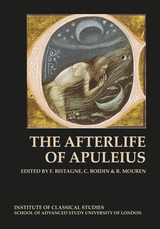
The volume gathers the proceedings of an international conference held in March 2016 at the Warburg Institute in London, in association with the Institute of Classical Studies. It includes both diachronic overviews and specific case-studies. A first series of papers focuses on The Golden Ass and its historical and geographical diffusion, from High Medieval Europe to early modern Mexico. The oriental connections of the book are also taken into account. The second part of the book examines the textual and visual destiny of Psyche’s story from the Apuleian fabula to allegorical retellings, in poetical or philosophical books and on stage. As the third series of essays indicates, the fortunes of the book led many ancient and early modern writers and translators to use it as a canonical model for reflections about the status of fiction. It also became, mostly around the beginning of the fifteenth century, a major linguistic and stylistic reference for lexicographers and neo-Latin writers. The last papers of the book deal with Renaissance polemics about "‘Apuleianism" and the role of editors and commentators.
This is the sixth and last of the volumes in the series of ‘Afterlives’ of the Classics, which is being produced jointly by the Institute of Classical Studies and the Warburg Institute.

Oratory and philosophy from a Latin novelist.
Apuleius, one of the great stylists of Latin literature, was born ca. AD 125 in Madauros to a politically prominent family and received an elite education in the provincial capital Carthage and at Athens, where he began a lifelong allegiance to Platonic philosophy. In the later 150s, he married Pudentilla of Oea, a wealthy widow, and seems to have enjoyed a distinguished public career in Africa and perhaps as an advocate in Rome.
Although Apuleius is best known for his picaresque novel Metamorphoses or The Golden Ass (LCL 44, 453), he also wrote and declaimed on a wide variety of subjects. This edition contains the other surviving works of Apuleius that are considered genuine. Apologia is a speech delivered probably in 158/59 in which Apuleius defends himself against in-laws who had accused him of having used sinister means, including magic, to induce Pudentilla to marry him. The Florida is a collection of twenty-three excerpts from speeches by Apuleius, probably all of them delivered in Africa; the title refers either to their florid style or to their resemblance to an anthology, perhaps both. De Deo Socratis (On Socrates’ God) takes the form of a speech addressed to a cultured, nonspecialist Latin-speaking audience that locates Socrates’ invisible guide and protector (daimonion) within the more general concept of daimones as forces intermediary between gods and humans.
The Loeb Classical Library edition of Apuleius is in three volumes.
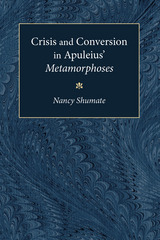
Shumate draws on a wide range of literary and nonliterary representations of conversion in order to establish a useful theoretical framework. The Metamorphoses is exposed as a text anticipating later narratives in its concern with world-building, with the narrator's subjective reality, and with the invocation and critique of religious experience.
Crisis and Conversion in Apuleius' "Metamorphoses" will be of interest to classicists and scholars of Silver Latin and of the increasingly popular ancient novel, as well as to students of psychology and the sociology of religious experience.
Nancy Shumate is Associate Professor of Classical Languages and Literatures, Smith College.
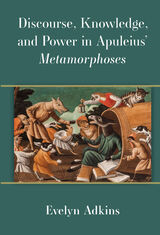
In ancient Rome, where literacy was limited and speech was the main medium used to communicate status and identity face-to-face in daily life, an education in rhetoric was a valuable form of cultural capital and a key signifier of elite male identity. To lose the ability to speak would have caused one to be viewed as no longer elite, no longer a man, and perhaps even no longer human. We see such a fantasy horror story played out in the Metamorphoses or The Golden Ass, written by Roman North African author, orator, and philosopher Apuleius of Madauros—the only novel in Latin to survive in its entirety from antiquity. In the novel’s first-person narrative as well as its famous inset tales such as the Tale of Cupid and Psyche, the Metamorphoses is invested in questions of power and powerlessness, truth and knowledge, and communication and interpretation within the pluralistic but hierarchical world of the High Roman Empire (ca. 100–200 CE).
Discourse, Knowledge, and Power presents a new approach to the Metamorphoses: it is the first in-depth investigation of the use of speech and discourse as tools of characterization in Apuleius’ novel. It argues that discourse, broadly defined to include speech, silence, written text, and nonverbal communication, is the primary tool for negotiating identity, status, and power in the Metamorphoses. Although it takes as its starting point the role of discourse in the characterization of literary figures, it contends that the process we see in the Metamorphoses reflects the real world of the second century CE Roman Empire. Previous scholarship on Apuleius’ novel has read it as either a literary puzzle or a source-text for social, philosophical, or religious history. In contrast, this book uses a framework of discourse analysis, an umbrella term for various methods of studying the social political functions of discourse, to bring Latin literary studies into dialogue with Roman rhetoric, social and cultural history, religion, and philosophy as well as approaches to language and power from the fields of sociology, linguistics, and linguistic anthropology. Discourse, Knowledge, and Power argues that a fictional account of a man who becomes an animal has much to tell us not only about ancient Roman society and culture, but also about the dynamics of human and gendered communication, the anxieties of the privileged, and their implications for swiftly shifting configurations of status and power whether in the second or twenty-first centuries.
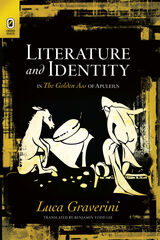

A beguiling tale of mistaken transformation.
In the Metamorphoses of Apuleius, also known as The Golden Ass, we have the only Latin novel which survives entire. It is truly enchanting: a delightful romance combining realism and magic.
The hero, Lucius, eager to experience the sensations of a bird, resorts to witchcraft but by an unfortunate pharmaceutical error finds himself transformed into an ass. He knows he can revert to his own body by eating rose-petals, but these prove singularly elusive; and the bulk of the work describes his adventures as an animal. He also retails many stories that he overheard, the most charming being that of Cupid and Psyche (beginning, in true fairy-tale fashion, ‘Erant in quadam civitate rex et regina’). Some of the stories are as indecent as they are witty, and two in the ninth book were deemed by Boccaccio worthy of inclusion in the Decameron. At last the goddess Isis takes pity on Lucius. In a surprising denouement, he is restored to human shape and, now spiritually regenerated, is initiated into her mysteries. The author’s baroque Latin style nicely matches his fantastic narrative and is guaranteed to hold a reader's attention from beginning to end.
The Loeb Classical Library edition of Apuleius is in three volumes.

A beguiling tale of mistaken transformation.
In the Metamorphoses of Apuleius, also known as The Golden Ass, we have the only Latin novel which survives entire. It is truly enchanting: a delightful romance combining realism and magic.
The hero, Lucius, eager to experience the sensations of a bird, resorts to witchcraft but by an unfortunate pharmaceutical error finds himself transformed into an ass. He knows he can revert to his own body by eating rose-petals, but these prove singularly elusive; and the bulk of the work describes his adventures as an animal. He also retails many stories that he overheard, the most charming being that of Cupid and Psyche (beginning, in true fairy-tale fashion, ‘Erant in quadam civitate rex et regina’). Some of the stories are as indecent as they are witty, and two in the ninth book were deemed by Boccaccio worthy of inclusion in the Decameron. At last the goddess Isis takes pity on Lucius. In a surprising denouement, he is restored to human shape and, now spiritually regenerated, is initiated into her mysteries. The author’s baroque Latin style nicely matches his fantastic narrative and is guaranteed to hold a reader's attention from beginning to end.
The Loeb Classical Library edition of Apuleius is in three volumes.
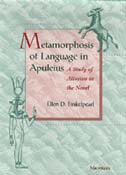
When Apuleius wrote his Metamorphoses, the novel--indeed the very concept of fiction in prose--was new. This study argues that Apuleius' repeated allusions to earlier Latin authors such as Vergil, Ovid, and Seneca represent an exploration on his part of the relationship between the novel and more established genres of the era. Apuleius' struggle with this tradition, Finkelpearl maintains, parallels the protagonist's move from an acceptance of the dominance of traditional forms to a sense of arrival and self- discovery.
An introductory chapter includes general discussion of the theory and practice of allusion. Finkelpearl then revisits the issues of parody in Apuleius. She also includes discussion of Apuleius' use of Vergil's Sinon, the Charite episode in relation to Apuleius' African origins, and the stepmother episode. Finally a new reading of Isis is offered, which emphasizes her associations with writing and matches the multiformity of the goddess with the novel's many voices.
This book will be of interest to scholars of literature and the origins of the novel, multiculturalism, and classical literature.
Ellen D. Finkelpearl is Associate Professor of Classics at Scripps College, Claremont, California.
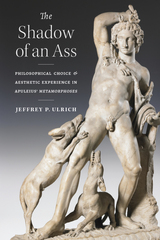
Situating the novel in a long history of philosophical and literary conversations, Ulrich suggests that the Metamorphoses anticipates much of the philosophical burlesque we tend to associate with early modern fiction, from Don Quixote to Lewis Carroll.
READERS
Browse our collection.
PUBLISHERS
See BiblioVault's publisher services.
STUDENT SERVICES
Files for college accessibility offices.
UChicago Accessibility Resources
home | accessibility | search | about | contact us
BiblioVault ® 2001 - 2025
The University of Chicago Press









